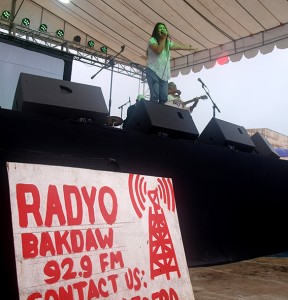Viviane Fluck, a disaster communications expert at Radyo Bakdaw in the Philippines, describes how important broadcast weather reports are for reassuring people rebuilding after Typhoon Haiyan
It has been raining. A lot. There has been the constant drizzle that slowly drenches your clothes without you being quite aware of it. There have been monsoon type rainfalls that are so loud they stop every conversation and there has been rainfall coming with wind that angrily beats tents on all sides.
A tropical depression called Agaton has arrived, taking its time to move away from Eastern Samar. After the region was hit by Typhoon Hayian (Yolanda) Internews’s Radyo Bakdaw turned into a focal point for weather information.
In another place weather would just be a topic for chit chat. In Guiuan it is much more. Bad weather means memories of Yolanda — children not sleeping at night because they’re afraid of the rain and tents and tarps in danger of breaking. It means athlete’s foot and constantly damp clothes. Over two weeks in which the sun hasn’t come out from behind grey rain clouds.
Rumours swirling
Since Yolanda, weather updates have become an important topic. Agaton’s presence made news on the weather even more crucial. “How bad is the weather going to be?” and “how long is it going to stay this way?” are questions everybody seems to want an answer to. As a radio listener messaged: “Your report about the weather update is really a big help for us.”
Agaton at its strongest produced winds of up to 60 km per hour, forcing a complete evacuation of all 261 families from the tent city. While everybody was trying to get ready for the storm, rumours turned up online and via text messages, saying that “Yolanda II” was on the way to Guiuan.
After having been through typhoon Yolanda, these kinds of rumours spread fast and are extremely unsettling for the affected communities. Radyo Bakdaw received a lot more messages asking about “the next typhoon”. One text message for instance reads: “Hi Kuya [big brother], I just want to ask if there’s no typhoon in Samar? We’re so scared right now, because of the strong wind and the rain.”
The consolation of information
While tarps, tents and newly fixed roofs were damaged again, the volunteers at Radyo Bakdaw were trying their best to keep the generator going and stay on air. To address rumours and inform listeners, the station ran hourly weather updates. Collaborating with the local weather station Pagasa and local government, experts on weather and disaster risk reduction gave live interviews on the situation informing and reassuring local people.
Having a presenter say ‘it’s a bad day’ and everybody knowing that she, just as everybody in the community has been worrying about whether or not the newly built roof will last the night sends a strong message of solidarity and understanding to the community.

Singing in the rain
Despite the strong and continuous rain, Filipino pop idols recently came together with local artists to bring Guiuan the first big concert after the typhoon (pictured). Underneath a sea of colourful umbrellas the crowd clapped loudly when local bar owner Ellen sang the Gloria Gaynor hit, I Will Survive, and started dancing and singing alongside hits sung by national folk rock stars Lolita Carbon and her band Asin.
Radyo Bakdaw’s Kuya Philip was MC, and he interviewed two listeners about how they had donated and received wheelchairs with the help of the station. The concert was broadcast live to locals.
No matter whether it is through giving useful information about evacuation procedures during the storm or participating in and broadcasting a community event, the station’s broadcasters have been working hard to make their tagline “helping you to help each other” a reality.
Radyo Bakdaw is a community radio station that was set up in Guiuan, just two weeks after Typhoon Haiyan hit. Viviane is a PhD candidate in Participatory Communication and Disaster Management and Mitigation at the University of East Anglia
Related Posts
11th December 2013
After the typhoon: rebuilding with radio in the Philippines
We hear from a disaster communications…
2nd August 2013
The Business of Broadcasting in the Digital Age – Speakers
10th December 2012
The true cost of broadcasting with public funding: accountability
A Manx tale: The CBA's Sally-Ann Wilson…